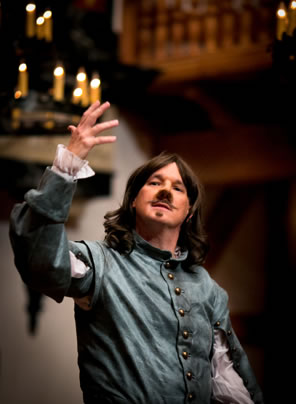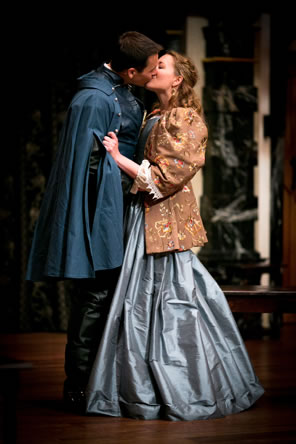Cyrano de Bergerac
Giant Character; Giant Talent; Giant Nose
By Edmond Rostand (translated by Anthony Burgess)
American Shakespeare Center, Blackfriars Playhouse, Staunton, Va.
Saturday, June 21, 2014, B–8&9 (front middle stalls)
Directed by Jim Warren
French playwright Edmond Rostand in 1897 created out of the historical record an almost perfect dramatic character: the wittily wise man of action with the big nose, Cyrano de Bergerac, whose faults (he is one egotistical, mean guy) match his qualities (he has a stalwart sense of honor and a huge capacity for unconditional love). He's like Stephen Hawking, LeBron James, Tina Fey, Nelson Mandela, Kanye West, and an Olympic ski jump wrapped in one.

John Harrell is Cyrano de Bergerac in the American Shakespeare Center production at the Blackfriars Playhouse. Photo by Lindsey Walters, American Shakespeare Center.
Such an outsized character with an outsized protuberance deserves an outsized actor to play him, and the American Shakespeare Center in Staunton, Va., has such an actor in its company, John Harrell. Matching the intellects of Rostand (via translator Anthony Burgess) and Cyrano himself with Harrell results in an exquisite performance anchoring a production solidified by ideally cast supporting actors.
Director Jim Warren in his program notes goes to great lengths to defend the choice of Cyrano de Bergerac in the repertory of a Shakespearean company performing in the Blackfriars Playhouse, the world's only replica of Shakespeare's own indoor theater. Among his arguments are the play's reliance on language and its opening scene set in a Paris theater circa 1640, allowing the production to serve as further exploration of that era's staging conditions (no fourth wall, universal lighting) and production techniques. He also points out that Rostand based his title character on the real Cyrano de Bergerac—who was a playwright and poet as well as an accomplished duelist with a hawk-beak nose—born a few years after Shakespeare's death. Rostand's portrayal, though, is about as historically accurate as Tom Stoppard's portrayal of Shakespeare in Love's title character—and just as fun.
Warren's arguments are all very well, but reason enough to stage this play is the acting troupe he has assembled for ASC's 2014 summer and fall seasons, some newcomers joining longtime company veterans and a couple of returning stars. Newcomer Sara Hymes plays Roxane, Cyrano's cousin and love interest. Not only is Hymes a 10 on the ubiquitous 1–10 scale of hotness, she portrays the character's intelligence even as she gives over so completely to her heart in throes of lust for Christian and what she thinks are his sublime language skills (one thing I most admire about Rostand's play is how it champions sexual lust for language; I'm certainly down with that). Playing Christian is Patrick Midgley, a 12 on the 1–10 scale of hotness, and returning to ASC's resident troupe after two years in the touring company. Christian may be tongue-tied in the presence of women and lack the wordsmith skills of a courtier, but he has a heart of gold, a soul of great courage, and a common-sense wisdom, all of which Midgley captures in his performance. For all the brilliant comedy Cyrano speaks in this play, Christian speaks some of the play's best one-liners—"I want to be loved for what I am, comely and dumb," he says at one point—and Midgley nails these with Ellen DeGeneres confidence.
James Keegan, returning to the ASC after a year's absence, plays De Guiche, the arrogant nobleman who also is in love with Roxane and plots to entrap her in marriage, hires 100 thugs to set upon Cyrano's friend and fellow poet Lignière (Jonathan Holtzman), and schemes to get rid of Cyrano himself as well as Christian when he learns that Roxane has married him. De Guiche is the play's villain, but Keegan portrays ego rather than evil, authority rather than vitriol, and when De Guiche himself shows uncommon valor in the wars and comes around to a high regard for Cyrano (and a lingering affection for Roxane, despite her double-crossing him), we are unhesitatingly filled with respect for Keegan's character.
What might be the play's trickiest part, Le Bret, Cyrano's fellow soldier and best friend, is played by longtime ASC veteran René Thornton Jr., who, with each season, seems to ascend to ever-higher performance standards. Cyrano's personality and behavior earns him many enemies, to the point that a variety of hired assassins are stalking him by play's end; so for him to yet achieve such a true-hearted friend as Le Bret takes some suspension of belief. Thornton's Le Bret is not only a brother-in-arms for Cyrano but an older brother in spirit, highly respectful of Cyrano's skills in war and wit but always providing a loving brake on Cyrano's runaway ego, watching his back, and encouraging him on, in war and in love, nose be damned.
At the risk of turning this into a laundry-list review, I offer individual kudos for deserving contributions by the rest of the company. Newcomer Benjamin Reed plays Cyrano's poet protégé and pastry chef Ragueneau with bustling earnestness. Gregory Jon Phelps as Valvert, the overly pompous peacock, has to balance the character's obvious silliness with seeming dangerous sword-fighting skills in order to maintain the tension as well as the entertainment of his duel with the verse-speaking Cyrano. Chris Johnston shows his widening range in the excessively foppish actor Montfleury, whom Cyrano has threatened to kill, and the musketeer D'Artagnan, who clearly could match Cyrano in swordsmanship. Sarah Fallon makes a most slutty Lise, wife to Ragueneau, and a cute Marguerite, mother superior of the convent where Roxane resides in the last scene. And Allison Glenzer gets the night's biggest laugh as Duenna, Roxane's chaperone, who is sent off to taste-test pastries at Ragueneau's shop so Cyrano and Roxane may speak in private: at one point Glenzer's Duenna checks in on the couple, appearing at the door with her cheeks smeared in chocolate and various fruit creams.
It's all solid ensemble acting typical of ASC's high company standards, and yet rising above it all—literally, in one scene—is Harrell's Cyrano. The longest-tenured member of ASC's acting company, Harrell is one of the most accomplished comic actors playing the boards today—any boards—with sublime skills in Shakespeare verse speaking. Whether it's Hamlet, Feste, or Henry V's Chorus, he massages comic readings out of the verse through scholastic understanding and theatrical instincts. And no matter how slimy or evil his characters may be, his portrayals are always endowed with a resonating charm so that we may smile and smile and still see him a villain.

Christian (Patrick Midgley) kisses Roxane (Sara Hymes) after Cyrano successfully woos for him in the ASC production of Cyrano de Bergerac at the Blackrfiars Playhouse. Photo by Lindsey Walters, American Shakespeare Center.
With the verse-speaking cavalier Cyrano, Harrell goes way beyond wry line readings, comic inflections, and poignantly delivered poetry: he lives Cyrano's life and he involves us in that journey. Cyrano is much-talked-about in the theater-set opening scene, leaving us in high anticipation of his arrival. As the action is happening all around us (Le Bret even takes a seat behind us in row C), we know not where, let alone when, Cyrano might appear. When he finally does appear, it's his voice rising from somewhere among us. Cloaked, hat pulled low over his eyes so that only his nose peers out from under the brim, he is unquestionably dangerous, a bully, even, in the way he drives Montfleury off the stage, ridiculous though the actor may be. Yet, Cyrano pays the theater manager (Jonathan Holtzman) enough to cover the evening's box office, which indicates his noble nature, especially as we soon learn he has little money for himself. Then, more dangerous bullies appear in the form of Keegan's De Guiche and Phelps's Valvert, and just like that, Cyrano becomes our hero; he has driven out bad theater in Monfleury and now he kills bad people in Valvert, and he does so on a rhyme. He wins over our intellect with this word swordplay; he wins over our heart with his pining for Roxane; he wins over our sympathy with his refusal to court her due to his ugly nose; he wins over our soul with his championing of Christian when he learns Roxane loves the young recruit in Cyrano's company of soldiers.
Through all of this, Harrell gets stiff competition from his nose for the audience's attention. It's not just big; it is like a Utah mountain rock face that changes according to your perspective and the light hitting it. It's certainly long, it hooks according to its mood, and yet it resembles a pig snout for audience members looking up at him from row B. In one scene, Harrell jumps onto a table, and with the Blackfriars' chandeliers lowered for this season, you fear Cyrano's nose might catch fire.
As Harrell competes with his nose, his character is competing with Rostand's penchant for melodrama and overlong scenes. This is a playwright who obviously has become enamored of Cyrano, too. But with Harrell's portrayal of the character, we don't feel any of the plot's shallowness or the play's length. We feel only heartbreak when Cyrano triumphs in the knowledge that his words have wooed Roxane and she is truly in love with him, though his words are put in Christian's mouth and letters, and it is he she marries. We feel frustration and great sympathy when both Christian and Cyrano learn at a moment of crisis the true nature of Roxane's love, but Cyrano outwits Christian to maintain their ruse, for both her sake and Christian's sake, which shows the full depth of his own love for Roxane. And in the end, as Cyrano's inevitable death creeps forward, we, like Roxane, hang on to him, not wanting to let go—indeed, wishing we could get a do-over and bring him the happiness he so deserves.
Except, that Cyrano wouldn't want a do-over or, if he got one, he wouldn't change a thing. He seems to thrive on sadness and sacrifice. Maybe the feeling at play's end is not that he should live again but that, despite the fact the show has well passed the three-hour point, he should live longer. It is telling, though, that he does not die alone. He dies in Roxane's arms and in the company of his most loyal followers: Le Bret, Ragueneau, and us. We mourn the too-early loss of this giant personality; but we are more than fulfilled by the giant talent who shared that life with us.
Eric Minton
July 1, 2014
Comment: e-mail [email protected]
Start a discussion in the Bardroom



 Find additional Shakespeareances
Find additional Shakespeareances